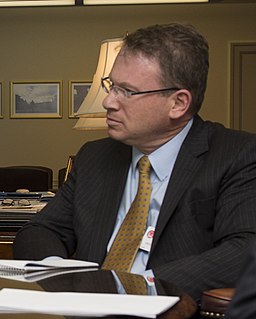A Quote by Anne Applebaum
All over the world, the Trump administration is pursuing a range of policies: tweeting insults at Maduro, negotiating with a defiant North Korea, sending a small fleet of warships to the Persian Gulf to intimidate Iran. But the speed with which the president always sours on these efforts means they can never be part of any discernible strategy.
Related Quotes
China is ruthlessly pragmatic. It supports North Korea for its own selfish interests. And I believe that China no longer considers us an ally. The current president, Xi Jinping, cultivates close relations with South Korea. He has never met with me, the leader of North Korea, something that the leader of China has always done. At the grand celebrations in Beijing two years ago commemorating the 70th anniversary of the end of World War II, he placed the president of Russia and the president of South Korea at his side. In North Korea, we pay a lot of attention to ceremonies and what they signal.
During the periods when South Korea played a more active role, the inter-Korean relationship was more peaceful, and there was less tension between the United States and North Korea. The last U.S. administration pursued a policy of strategic patience and did not make any effort to improve its relationship with North Korea. Also, the previous Korean government did not make any such efforts. The result is the reality you see today - North Korea continuing to advance its nuclear and missile program.
I believe President Trump is more reasonable than he is generally perceived. President Trump uses strong rhetoric toward North Korea, but during the election campaign, he also said he could talk over a burger with Kim Jong-un. I am for that kind of pragmatic approach to resolve the North Korean nuclear issue.
The Chinese get over 40 percent of their oil from the Middle East through the Persian Gulf, but have you ever seen a Chinese aircraft carrier sitting inside the Persian Gulf? For at least 40 years, the United States of America has been guaranteeing Chinese energy supplies. Sitting here today, the US provides funds to, honest to God, 99 percent of the countries on the planet. We even give North Korea humanitarian aid. We give them food, and God knows what they do with it. They probably feed it to the crooks in the headquarters.
I can actually approve of some of Donald Trump's North Korea policy, the sanctions, for example, doing things that other presidents would have done. But it's impossible to imagine any other president going before the U.N. General Assembly and referring to the dictator of North Korea as "Rocket Man," or issuing this series of blustery threats, which, frankly, are terrifying, and are raising the risk of a needless war.
My guess is that Trump will begin withdrawing troops from Europe at a slow pace. He will demand a renovation of the Iran Accord and get nowhere with this. There might be more US sanctions on Iran. However, the Iranians will not compromise with Trump, and barring a naval confrontation in the Persian Gulf, it will be US businesses that will suffer and Trump's frustration level that will go up.
By accident of geography, the world's major oil resources are in Shi'ite-dominated areas. Iran's oil is concentrated right near the gulf, which happens to be an Arab area, not Persian. Khuzestan is Arab, has been loyal to Iran, fought with Iran not Iraq during the Iran-Iraq war. This is a potential source of dissension. I would be amazed if there isn't an attempt going on to stir up secessionist elements in Khuzestan.
In the 1950s, Pakistan allied with the United States in something called the Central Treaty Organization. We were lined up with, at that time, Iran, ruled by the Shah, and Pakistan and Turkey as a southward shield against Soviet expansion toward the warm waters of the Indian Ocean and the Persian Gulf. It was part of the containment strategy.
The Arab leadership, after so many years of Obama, they're positively giddy about the arrival of Donald Trump. And when they are giddy, like any other leaders, they might over step. And the danger, of course, is initiating a confrontation with Iran that the U.S. really doesn't want to be involved with at any given moment. They have enough to worry about on the North Korea file.
The North Korean regime remains one of the world's leading proliferator of missile technology, including transfers to Iran and Syria. The transfer of nuclear weapons or material by North Korea to states or non-state entities would be considered a grave threat to the United States, and we would hold North Korea fully accountable of the consequences of such action.































